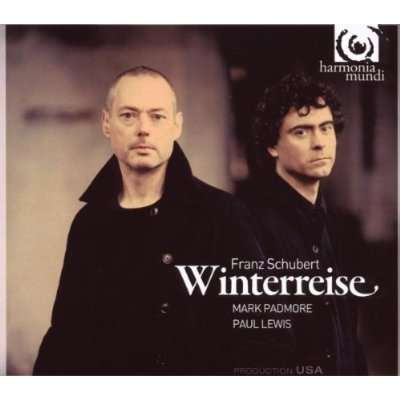|
Back
11/01/2010
Franz Schubert: Winterreise, D. 911
Mark Padmore (tenor), Paul Lewis (piano)
Recorded at Air Studios, Lyndhurst Hall, London (Nov/Dec 2008) – 74'18
harmonia mundi HMU 907484 – Booklet in English, French, German

Looking through the discography of Schubert's Winterreise, one is immersed in a luxuriously rich host of singers and pianists. There is no lack of exceptional recordings of this exceptional Liederkreis, and jumping into that fray with a new recording of the work must be a daunting task indeed. Will the stentorian pianism of Sviatoslav Richter supporting the ripened tenor of Peter Schreier be eclipsed? Will the probing musicality, uncanny intonation and sensitive pianism of the Ian Bostridge/Leif Ove Andsnes collaboration be imitated or rejected? Will any of the historically-informed yet stunningly contemporary performance aspects given to us by Christoph Prégardien and Andreas Staier be adopted, or will the singer opt for an "old school" approach in the manner of Hans Hotter and Gerald Moore? Further questions come to mind when comparisons are made with the baritones and mezzo-sopranos who have recorded the work. Does the recording itself satisfy, so it will be sufficient for a listener who only wants or needs one version of the work? Is it a worthy addition to a seasoned collector's dozens of already-procured versions? Tenor Mark Padmore – excellent in his previous discs of Handel and Britten – is joined by pianist Paul Lewis – capable and stalwart, yet unexciting in his highly-acclaimed Beethoven cycle – in this handsomely new produced reading from Harmonia Mundi. In the end, however, the production is slightly let down by less than ideal singing from Padmore and blasé, removed accompaniment from Lewis.
The opening of "Gute Nacht" should set the tone of the cycle, and Lewis' introduction intimates that this reading will be one that downplays Schubert's expressive markings. Lewis crescendos through the first measure, the diminished chord at the end of the second bar played in a fluid dynamic continuum instead of fortepiano as indicated in the score. As Graham Johnson has noted (and as he plays it for Goerne), "this figure is intensely physical in its effect and it adds a thrust of resolute determination to the implacable trudge." Lewis envelops it into the texture, and this is par for the course for the cycle. The small mordent a few bars later isn't the appropriate chilly shiver in the texture. Compare it to the mordents at the opening of "Frühlingstraum", which should be more relaxed, but instead are snappier and colder. Subtle but important dynamic differentiations, such as the change from piano in the introduction of "Erstarrung" to pianissimo when the voice enters, are simply ignored. There is no dynamic ebb and flow in the opening gushes of wind through the branches of "Der Lindenbaum", and the ensuing echo effect, so brilliantly realized by Andreas Staier on fortepiano, is downplayed here. There are some textual oddities, as well. Much as I like Lewis' emphasis of the dissonant grace note against the drone in "Der Leiermann", every score I have seen indicates that it should cease after the first two bars. Lewis continues it straight through to the end of the song, creating an entirely different mood than what it appears Schubert intended.
Lewis' shortcomings have a detrimental effect that even the most sensitive voice would find practically insurmountable. Padmore has a fine tone throughout the cycle, but shear beauty of sound is eclipsed by the most memorable aspect of his performance: the excessive breaths he takes that frequently interrupt the flow of the musical line. Breathing in the middle of the first phrase of "Der greise Kopf" is simply unmusical. Likewise, the high A-flat on "meinen" in "Erstarrung" is broken off from its approach by a needless break. Schubert was extremely sensitive and purposeful in composing such fissures into the music, such as at the eighth rest in the middle of the first phrase of "Wasserfluth". A wonderful world of subtle contrasts emerges when such details in the score are accurately realized.
There are some pleasant surprises along the way. "Letzte Hoffnung" has a wonderfully playful off-kilter feel (though Lewis again ignores the many accent marks littered throughout the score). The opening hymn of "Der Wirtshaus" is gorgeously voiced and shaped (though Padmore again upsets the first phrase with a breath). I've admired Padmore's singing but cannot say I've been won over by Lewis' pianism, and it seems that they simply are not a musical match. There is much more symbiosis between Padmore and Roger Vignoles in their Britten recital, for instance, which is thoroughly engaging, idiomatic and memorable. Even if a buyer is only looking for one version of this cycle, this shouldn't be it. Seasoned collectors will also likely be disappointed.
harmonia mundi's production is excellent on the set. George Gelles' essay is thoughtful and concise, and full texts with French and English translations are included. The recorded sound lacks intimacy, and there also seems to be a low, faint hum throughout.
Marcus Karl Maroney
|